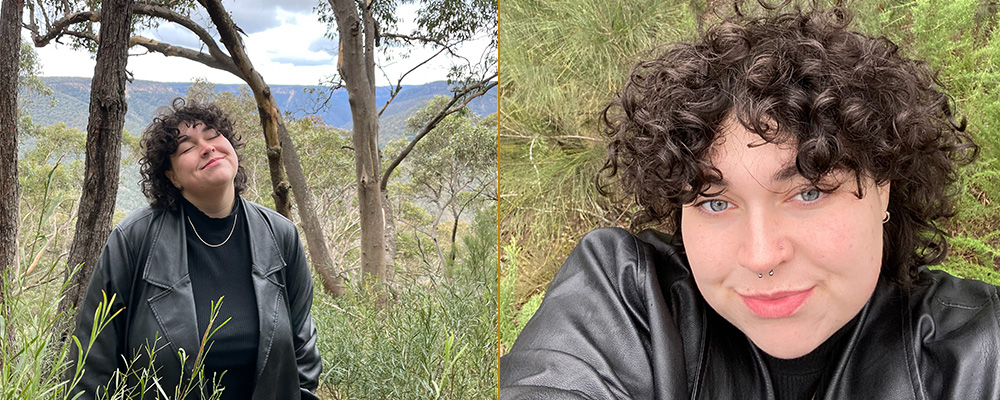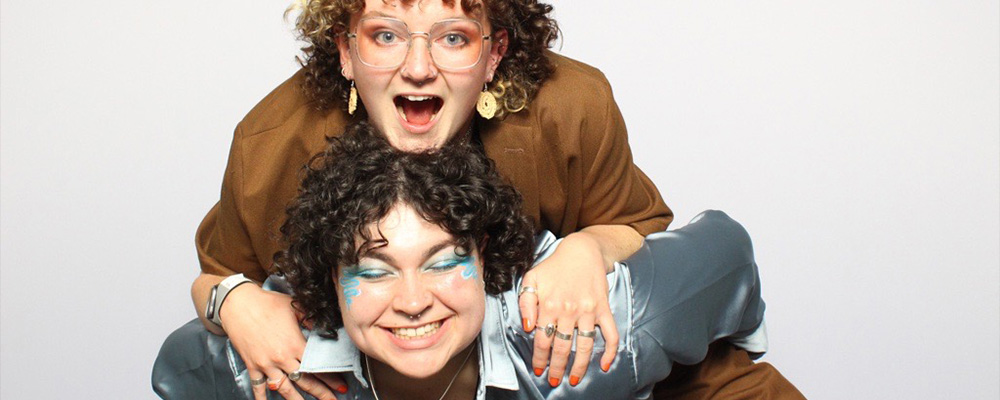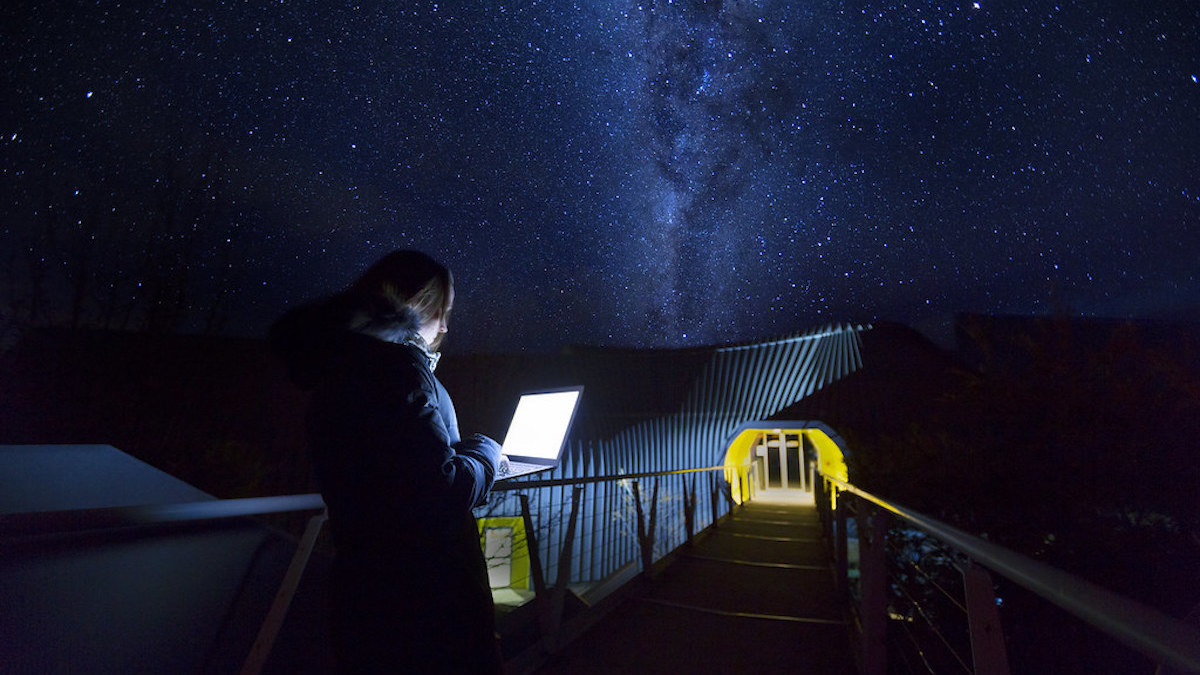Bel Humphreys was never quite sure about what to do when they grew up. Family, after many dinner table arguments, suggested a career as a lawyer. At one point, Bel even considered biological science. But their real passion was always politics. The only problem was where to study it.
Overview
- Bel grew up in a low income household in Maitland and never expected to study at ANU.
- After coming to Canberra and the ANU campus, they were surprised at the diversity on campus.
- Bel is hoping to work for the Department of Foreign Affairs and Trade (DFAT) after finishing study.
Growing up in a low-income household in Maitland, New South Wales, it seemed like the local uni was the only option. It was, in fact, the only place Bel looked at degree options, but none seemed like the right fit.
Things changed when a friend from the school year above went to ANU. Her excitement was infectious and suddenly Bel saw a whole new world of possibilities outside of Maitland.
After applying, Bel was fortunate enough to get an early offer.
“I was just honestly lucky I found out that early offers existed because my careers counsellor told me they didn’t. It definitely made me feel a lot calmer. Having accommodation sorted early was also very, very reassuring,” says Bel.
For someone who still wasn’t sure what they wanted to be, ANU was perfect, Bel says.
“One of the main things was definitely the huge flexibility in degrees. I could study multiple things I was passionate about because I really like English literature and screen studies but also like politics, so being able to combine a wide variety of interests was great.”
Bel took advantage of that flexibility by choosing to study a Flexible Double Degree. The ability to start out with a Bachelor of International Relations/Bachelor of Security Studies and then change the second degree to a Bachelor of Arts gave Bel the opportunity to shift their major to Middle Eastern and Central Asian studies.
"That’s probably another reason I came to ANU because I think the Indigenous support is almost unparalleled."
“In the first semester of my first year I didn’t know what course to take. So, I took an intro to the Middle Eastern course and fell in love with it, so I changed over to Middle Eastern and Central Asian studies," Bel says.
"I am adamant that the Centre for Arab and Islamic Studies (CAIS) is the best centre at ANU. I think all the lecturers are phenomenal; I just genuinely loved how the courses were taught.”

Bel hikes through the Australian bush in Namadgi National Park just a stones through from the ANU campus.
Finding a community
Coming to ANU, what really surprised Bel was how diverse the people were. They’d expected a campus full of stock standard Sydney Grammar students but instead found a sense of community here.
"There really are people from diverse backgrounds at ANU. Even those not from my background are nice people who empathise, but I have also found people who can relate and be like ‘yeah, I get it’.”
Finding that community was easy for Bel, who lived on campus for years.
“Part of it was just the convenience of the location because, I mean, I could just go on Facebook and see an event was on campus and could just go; I didn’t have to think about it. I’d just leave my room and it’d be a fiveminute walk. Having everyone around you, students who get where you're at, it does build good culture and connections.”
Bel, a First Nations student, also found a community at the Tjabal Indigenous Higher Education Centre. They describe it as “a godsend and my safe haven.”
“That’s probably another reason I came to ANU because I think the Indigenous support is almost unparalleled. I’ve looked at other universities' Indigenous support systems, because I’ve been thinking about postgraduate studies and whatnot, and I really just think that the Tjabal Centre is phenomenal.”
Despite only coming to Canberra once before for their Year Six camp (their most distinct memory of the city was getting food poisoning at Questacon), it was still exciting.
"Being in the capital, studying politics, it doesn’t really get better than that..."
“Being in the capital, studying politics, it doesn’t really get better than that – especially when I started to get really interested in international politics and diplomacy and stuff. I’ve had so many good internship experiences that I wouldn’t have had in Maitland or even in Sydney.”
Outside uni, Bel has found plenty to do in Canberra.
“I’m usually just hanging out with friends or going to explore something that I’ve just found online, and I’m like ‘everyone, we have to go to Gold Creek! There’s a weird psychic there and I want to know what they say,’ or something silly like that.”

Bel having a blast at the BIPOC Ball.
Now, approaching the end of their degree, there’s one thing Bel wants to do when it's finished: more uni.
“I do want to do a year of Honours, definitely. I would like to work at the Department of Foreign Affairs and Trade, like everyone studying international relations, but it’s very competitive.”
The best advice Bel can give a student considering ANU is:
“[Don’t] be afraid to ask for help, because there’s a lot more support systems than you think there are. When I came here, I was like ‘I don’t know what’s happening; I’m too scared to ask.’ It wasn’t until my second year that I became aware that things I needed were available to me and were way more accessible than I thought. When I started to ask I got help and assistance.”
Bel has also got a simple piece of advice for their 15-year-old self.
“Chill out. You’re fine, you’ve got this. Things will work out. And I probably honestly would tell myself to think about unis outside my hometown. I’d be like, ‘Have you thought about ANU? Maybe you should consider that now so you can be a bit more prepared.’”
Now that you've read about Bel Humphreys finding a community at ANU through the Tjabal Centre and their student residence, learn how to find your own at ANU.

